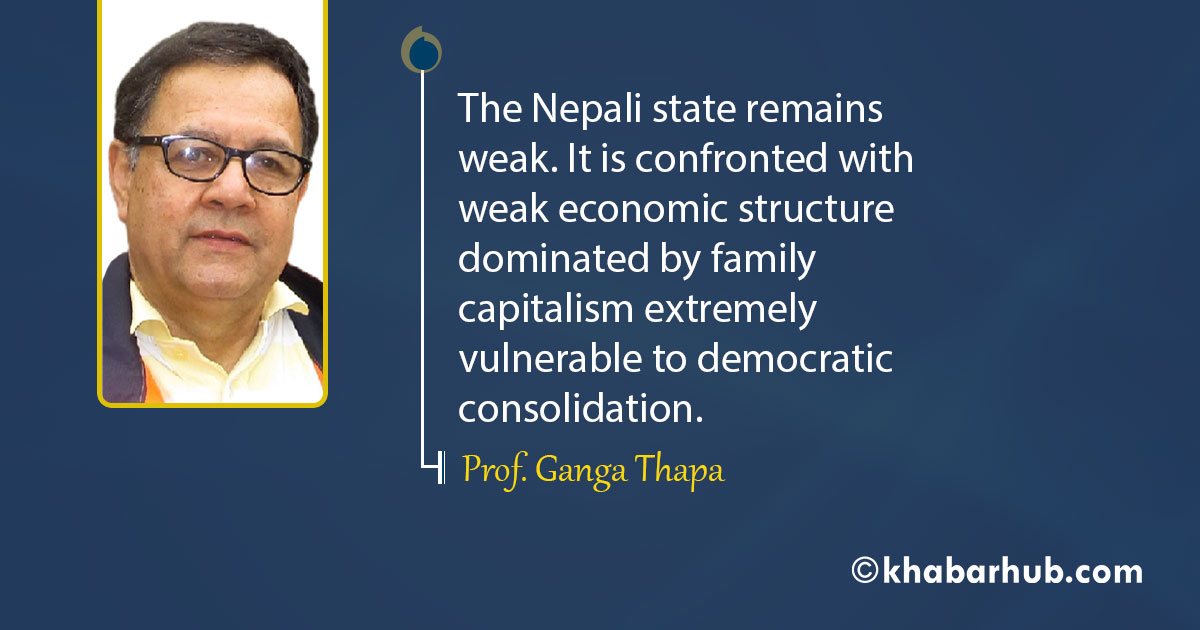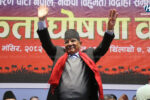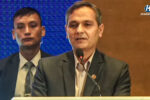Over three decades of vigorous study, one of the major political breakthroughs that has been discovered, is the process of democratic transition and consolidation with a remarkable level of economic growth and political instability as Rawls (1971) said pointing out the ‘conception of political liberalism characterized by the principles of justice and political virtues such as tolerance, reasonableness, and fairness’.
Although much confusion surrounds the initiative to restructure democratic public politics as a source of opportunity more actively, several countries around the world are in the process of introducing democracy into their political institutions yet.
We need to consider that despite levels of efficient and accountable authorities rising significantly, many are of the view that the legacies of the past such as ‘authoritarian’ and ‘dictatorial’ nature of the regimes that they introduced, operated or governed are still active in relation to political power.
Nonetheless, the Nepali state remains weak, for example, it is confronted with weak economic structure dominated by family capitalism extremely vulnerable to democratic consolidation to which the state behaves according to its citizens’ expressed demands.
Unfortunately, things are not quite so easy in order to concentrate toward broader, more equal, more protected and more mutually binding polity. For example, Rawls emphasizes on justice as fairness that is grounded in some ethical system that has a fully articulated basis.
There seems to be no end to the numbers or the varieties to take account of differences in origins and outcomes around a specific policy issue.
Nonetheless, the Nepali state remains weak, for example, it is confronted with weak economic structure dominated by family capitalism extremely vulnerable to democratic consolidation to which the state behaves according to its citizens’ expressed demands.
Tilly (2007) rightly pointed out that the trajectory of democratization differs greatly depending on levels of political participation made by political institutions; occurs more widely in the public politics of democracies what we might call sustained translation of citizen’s expressed collective will, and requires greater trust, at least backed by non-conservative, rational choice and deliberative.
My previous analysis on Nepal, post-monarchy Nepalese regimes crossed the authoritarian threshold, for example, runs essentially from sham elections to fully competitive electoral systems helped to restore the confidence, lies primarily in a political system through which people modify their political beliefs and tactics as having a good chance of democracy qualitatively and overcoming continuously the negative aspects of traditional political regimes, a vital issue for all governments that are committed to being accountable to their people.
This implies that there is uncertainty in the real political world, but the position of citizens in democracy will be viewed more critical of their political authorities, even though from a practical perspective, integrating citizens into policy and decision-making process is a major challenge for governance in contemporary democracies.
Despite these events, actual reform efforts proved disappointing, and in several cases, parallel clientele structures and political corruption, the weak penetration of a political systemic culture and a huge patronage system on the whole — maybe it is probably an inherent evil on our judgments in the phase of democratic consolidation and in the establishment of what we tentatively call ‘civil and political, and economic, social and cultural rights’ in the long run.
The political problem became acute due to the lack of development of modern political organizations with a system better disposed to which people feel that the government is responsive to their interests by adopting population-based representation for identifying and aggregating preferences at the national scale.
There is another difficulty. It seems to me that there are fierce dissent and disagreement on the subject of far-reaching political reforms and excessive socioeconomic issues.
Furthermore, since a number of ideas and elements are used in the construction of a framework of justice, the essence of the argument is that no political system can be meaningful unless it becomes legitimate for everyone else.
And this, of course, requires replacing absolute state sovereignty by the rule of law, with particular reference to the political institutions which alone can confer genuine political citizenship; does imply that a common political culture under one set of liberal-democratic institutions, where despite substantial progress still remains inadequate.
This condition is now met worldwide.
Rawls argues that a good society may be ruggedly individualistic and determinedly selfish in nature in order to buy a government.
This, in turn, produces policies in an attempt to secure legitimate political authority that seeks to appeal as many citizens as possible where individual has decisive influence on a major governmental decision and producing outputs in the form of public policies, based on the autonomy of the rational individuals themselves prefer and they may hold the government accountable at least in a broad sense.
By implication too, recently there have been various models of the citizen’s capacity to make decisions and participate in the governmental process enlarging civil liberties and political rights with a structured and informed set of beliefs to make them richer and competitive which are the conditions for prosperity.
From a theoretical standpoint, for a democratic political regime to function efficiently and effectively, and remain from any potential for interruption, and for long-term gains in political efficacy, political leaders must rely on a fund of positive feelings on the part of citizens on the common good of their political community on the formation of a new identity. (Kanji and Tannahill 2014).
The issue here is the political one. This implies that there is uncertainty in the real political world, but the position of citizens in democracy will be viewed more critical of their political authorities, even though from a practical perspective, integrating citizens into policy and decision-making process is a major challenge for governance in contemporary democracies.
Akinola (2006) has argued that the thinking that the state can solve all the social problems is stretching it beyond its natural capacity.
This makes it corrupt, inefficient and highly centralized. So, it would seem reasonable to assume that politics is a function of the aggregate and goes in both direction — toward the policymaking process and toward those who initiate the opinion (Yeric and Todd 1989).
Although the questions remain as to how much influence the citizen has on policy and how the policymaker views citizen’s opinion, yet deliberative democracy emphasizes public reasoning and widespread and well-informed participation if the liberties guaranteed in justice as fairness are to be secured, and to give public policy, to be legitimate.
From a point of view of democratic consolidation, we may interpret that federalism is an arrangement whereby powers of government within a country are shared between different levels of governments, provide for the participation and ensure the access of numerous individuals and groups.
Here again, one can see that a federal system promotes mass politics over a complex, delicately balanced political regime at the edge of sectarian collapse.
Nepal is at crossroads that sometimes, we describe, is in a serious social malfunction and often on the losing side despite profound political transformation even though the political system continued to exist. It is beset with crises of nation-building and development, triggered by its incapability of political actors, the creation of representative political organs.
Now if, as we believe it does, the sketch shows in the era of what we call driven by traditional hierarchy and seems broadly inconsistent; it received only a little attention.
Nationally, autonomous politics of any sort is barely ever developed aiming at egalitarian reforms to fit integration of various social groups and economic activity within a set of political institutions that could prove more adequate to its survival as a plural country and to give a specific flavor to the new political culture in explaining the dramatic changes in Nepali politics.
One implication of our analysis is clearly a lack of effectively-expressed democratic habits; those making political decisions to determine the common values, time and again, are seen as undermining factors of democratic institutions, which eventually lead to important social, economic and demographic change, with a new consciousness and disillusionment dominated by a fictitious assumption primarily in isolating the process of democratic transition and consolidation.
Other factors have also contributed to the process though.
The ‘democratic deficit’ is also disengagement of citizens from the political system that is manifest by low voter turnout, a lack of trust in politicians, and a perception that democratic institutions lack legitimacy and accountability.
Nonetheless, the Nepali state is still not able to react adequately to the challenges of the society which is still characterized by a class politics and clientelism with hierarchical cleavages and socioeconomic differences despite the resources of average citizens, such as, education, income, and media exposure increased over the past few decades.
A review of Nepali politics suggests that small groups of individuals and organizations gain access to the political system through corruption, it is clearly those with substantial wealth who can have the greatest capacity to bend government policy in their direction.
We do not doubt that some aspects of political learning and feature of the present political system do not fit the democratic deliberation.
Perhaps Barber’s (2003) most important contribution is the insistence that the construction of democratic, liberal civilized society requires the rationale of a democratic state becomes a self-evident producing a continual supply of rational, self-respecting adults, confident in their ability to control themselves and their society, with a remarkable level of economic growth and political stability.
Casting a ballot is the most basic function of the democratic system, yet a product of poorly designed institutions lead to an increasingly unruly electorate, in Robert Dahl’s words’ ‘democratic deficit’, accountable; transparent, and effective real power resides with the unelected technocrats/advisors, which often meet secretly along with existing democratic institutions lack real power, and the decisionmaking authority is centralized in the hands of the political executive.
The ‘democratic deficit’ is also disengagement of citizens from the political system that is manifest by low voter turnout, a lack of trust in politicians, and a perception that democratic institutions lack legitimacy and accountability.
It has long been argued that any process of transition relies on legitimacy in order to succeed. To clarify the issue, the historical legacy is still to be found in Nepal.
Nepalese political scientists speak of patri-monializm of the state and characterize the relationship between the state and society as still semi-integrated in the political system, which prevents the emergence of a common legal culture.
A general principle that underlies the central hypothesis is that a task of state-building is a complex process, it is essential that the state is required to cope with the conflicts which have arisen from largely unseen and unforeseeable events to hold its people together.
With the promulgation of the new constitution, Nepal entered 2015 with much of its politico-economic future still obscure and uncertain.
We do not want to get too heavy on this, but there are of course, contexts; and in general, there appears not to have been, as yet, enough prospects that politicians are assumed to be motivated not to have a determinedly narrow self-interest but seek to appeal to as many citizens as possible then produce policies in an attempt to achieve democratic consolidation.
Democracy is a crucial device that ensures that individual choice is best achieved under conditions that allow the individual to maximize their potential for self-development.
A major concern here is that the government must regularly be accountable to citizens to enhance democracy through the community which is strangely absent here.
Although much confusion surrounds to devolving power at the local level through democratic governance, the enlargements of citizens’ rights and strengthening of the rule of law are more important; not just because the rule of law is a condition for the success of the free markets towards prosperity. But it is also the condition for a healthy polity.
Surely, Nepal has undertaken important measures in winning for the democratic political system, yet what makes a state legitimate is protecting basic human rights by means of the rule of the law and conserving the values of pluralism what Bartels (2008) and many others assert as a ‘new model of social cohesion in order to give citizens a reason to believe which has suffered damage.’
Given the pervasive nature of constitutional discourse in Nepal, it needs an associational democracy in which civil society organizations promote civic engagement and develop the skills of citizenship and make not only in representing the claims of citizens but also toward a common good that promotes a democratic, inclusive, peaceful country with sustainable economic growth as firm foundation.
In the end, of course, to say we don’t trust politicians because they are hypocrites is problematic. It itself is hypocrisy. In any case, Nepal is a democracy that is too demanding to be applicable in the real life of politics.
To put very simply, we elect the politicians — and if we elect and re-elect hypocrites, it means we don’t know how to use democracy well.
The fact that thousands of people died in the past and hundreds are still ready to die begging for political values which are capable of providing economic opportunity for the disadvantaged with respect to equal economic opportunities cannot be dismissed — we don’t believe we should tell them their sacrifice can only produce hypocrites.
Again, democracy is endangered not only when governments don’t work, but also when oppositions fail to provide an alternative.









Comment